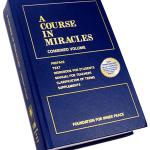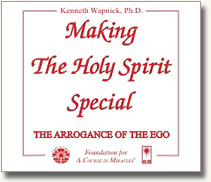
(By Tim Wise)
How do we see ourselves?
What does arrogance look like?
What does humility look like?
How does God see us?
As I was planning to do a Thursday Chat about arrogance and humility, I did what I do on any topic and started with Webster. On arrogance, the dictionary definition is “being full of excessive and overbearing pride.”
With humility, Webster sounds like the Course: “having or expressing a sense of selflessness.” Really, that’s what it says. That’s the #1 definition that’s used the most in everyday English for being humble… letting go of our sense of ‘lower-case’ self.

A couple of my own ideas about arrogance, for me anyway… include a few things:
1) It has a puffed-up unwarranted overkill about it, like a balloon full of hot air.
2) Arrogance is not very likable, if not mostly distasteful. My sense is even the arrogant don’t like it in others.
3) Finally, arrogance needs an audience. It demands an internal belief that others are acknowledging the arrogant’s superiority, whether it’s true others are really noticing or not.

For humility, I would agree with Webster on an attitude of selflessness. I would also add the Course’s principle that the truly humble focus on shared interests in the mind, and let go of their investments in the seeming external differences.
The Course’s Take on Arrogance and Humility:
The Course actually uses the words arrogance/arrogant 55 times, and humility/humble over forty. Whenever arrogance is spoken about in the Course, it is always in relationship to its opposite, humility. The two themes are covered for the most part in Lessons #61, 152, and 186. “True humility” is especially described as the top of the ladder of prayer, in the Song of Prayer Pamphlet, p. 8:
Prayer (defined in the Pamphlet as not supplication to the Holy Spirit for specifics, but as a state of communion with the HS) is the way to true humility… and true humility will come at last to grace the mind that thought it was alone and stood against the world… Its selflessness is Self… Humility has come to teach you how to understand your glory as God’s Son, and recognize the arrogance of sin.
(Excerpts from Song of Prayer p. 8)

Some Course thoughts from Les.#61…
“I am the light of the world.”
Who is the light of the world except God’s Son? This, then, is merely a statement of the truth about yourself. It is the opposite of a statement of pride, of arrogance, or of self-deception. It does not describe the self-concept you have made. It does not refer to any of the characteristics with which you have endowed your idols. It refers to you as you were created by God. It simply states the truth.
To the ego, today’s idea is the epitome of self-glorification. But the ego does not understand humility, mistaking it for self-debasement. Humility consists of accepting your role in salvation and in taking no other. It is not humility to insist you cannot be the light of the world if that is the function God assigned to you. It is only arrogance that would assert this function cannot be for you, and arrogance is always of the ego.
True humility requires that you accept today’s idea because it is God’s Voice which tells you it is true. This is a beginning step in accepting your real function on earth. It is a giant stride toward taking your rightful place in salvation. It is a positive assertion of your right to be saved, and an acknowledgment of the power that is given you to save others.
( WB, Les 61, p. 102, par.1-3)
Arrogance and humility are simply about how we see ourselves… we either are “the light of the world” we perceive, or we’re not. Our identification as separated egos insist on the latter. We believe we have done the impossible (a great definition of arrogance), and separated from our Father in Heaven. Now we believe we are these inflated balloons full of hot air (bodies), that will eventually deflate (die). How silly is that!
Of course, our ego would like to run in its own direction, relentlessly maintaining belief in separation. It would use all the above Course statements its own way, especially “the power that is given you (us) to save others.” The ego would make it all about separate bodies saving other separate bodies, especially my body/personality saving yours. However that power to save (i.e. wake up from the dream of separation) is never, ever, played out in the world behaviorally, or by the separated us at all.

Whatever happens in the world is always a mirror reflection of two (and only two) chosen thoughts or chosen teachers in the mind, the ego or Holy Spirit… If we are choosing the inner ego voice of belief in separation in our minds, whether we act like Crusader Rabbits (a cartoon from the 1950’s) saving anyone or everyone in the world, it will always be a refection of that teacher in our minds.
Whenever our behavior is reflecting an inner ego choice, any worldly act of kindness/salvation cannot help but be an act of arrogance! Full of hot air and blown-up pride. It typically manifests as… “I am Holier than tho, and I will save you, the lesser.”

These ego-based “kind” actions certainly have the ring of the three ideas above about arrogance:
- It’s puffed-up and overblown.
- It’s usually not wanted or liked or even appreciated, and if so… only temporarily, and then later resented.
- And it’s believed by the ‘do-gooder’ that he’s admired for it, or at least should be.
It doesn’t mean we should not help out in any situation. The Course is only saying what really matters is which internal teacher am I doing ‘the helping’ with…
—————————
For Part Two on “Arrogance vs Humility” on this website:

{including how do I know which teacher in my mind I am choosing}
click here
Also, for a more in-depth discussion of arrogance & humility,
see Ken Wapnick’s
“Making the Holy Spirit Special:
The Arrogance of the Ego”
(on 9 CD set or MP3 download)
click here


Celebrating The First Ten Years of…
School for A Course in Miracles: click here
Would you like to help the School for A Course in Miracles…
Grow and Expand?
Click here
